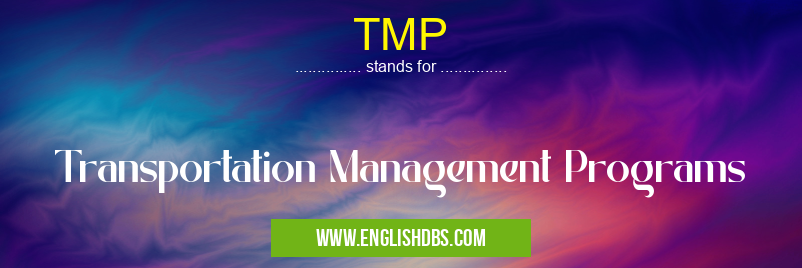What does TMP mean in TRANSPORTATION
Traffic Management:

TMP meaning in Transportation in Governmental
TMP mostly used in an acronym Transportation in Category Governmental that means Transportation Management Programs
Shorthand: TMP,
Full Form: Transportation Management Programs
For more information of "Transportation Management Programs", see the section below.
- TMP (Transportation Management Programs) are comprehensive strategies designed to improve the efficiency and effectiveness of transportation systems, particularly in urban areas.
- TMPs encompass a wide range of measures aimed at addressing transportation-related challenges, including traffic congestion, air pollution, and accessibility issues.
TMP Components
-
- Implementing traffic signal optimization, adaptive traffic control systems, and congestion pricing schemes.
-
Demand Management:
- Encouraging the use of alternative modes of transportation, such as public transit, cycling, and walking.
- Implementing parking management policies and flexible work arrangements to reduce peak-hour traffic.
-
Public Transportation Enhancements:
- Expanding and improving bus and rail services, including the introduction of high-capacity transit systems.
- Implementing real-time information systems and mobile ticketing platforms.
-
Infrastructure Improvements:
- Constructing new roads, bridges, and pedestrian/cycling facilities to enhance connectivity and reduce congestion.
- Upgrading existing infrastructure with intelligent transportation systems (ITS) technologies, such as traffic monitoring sensors and dynamic message signs.
-
Land Use Planning:
- Promoting mixed-use development and compact urban design to reduce travel distances and encourage non-motorized transportation.
Benefits of TMPs
- Reduced Traffic Congestion: TMPs can alleviate traffic congestion by optimizing traffic flow and reducing travel demand.
- Improved Air Quality: By promoting alternative modes of transportation and reducing vehicle idling, TMPs contribute to improved air quality.
- Enhanced Accessibility: TMPs aim to improve access to transportation for all users, including the elderly, disabled, and low-income residents.
- Economic Development: Efficient transportation systems can support economic growth by reducing business costs and improving connectivity for workers.
- Environmental Sustainability: TMPs promote environmentally sustainable practices by reducing carbon emissions and encouraging the use of non-motorized transportation.
Essential Questions and Answers on Transportation Management Programs in "GOVERNMENTAL»TRANSPORTATION"
What are Transportation Management Programs (TMPs)?
TMPs are comprehensive plans that aim to enhance the efficiency and sustainability of transportation systems. They consider various factors, such as traffic congestion, air quality, accessibility, and economic development. TMPs provide a framework for decision-making and guide transportation investments and policies.
Why are TMPs important?
TMPs play a crucial role in addressing transportation challenges and improving the overall quality of life. By optimizing transportation systems, they can reduce traffic congestion, improve air quality, enhance mobility for all users, and promote economic growth. TMPs help cities and regions plan for future transportation needs and make informed decisions that create more sustainable and livable communities.
What are the key components of a TMP?
TMPs typically include the following components:
- Data collection and analysis: Gathering data on current transportation patterns, traffic volumes, and air quality.
- Goal setting and objectives: Defining specific targets for improvement, such as reducing congestion, improving air quality, or increasing accessibility.
- Identification of strategies and measures: Developing a range of potential solutions, such as traffic signal optimization, public transit improvements, or bike lane construction.
- Evaluation and prioritization: Assessing the feasibility, cost-effectiveness, and environmental impacts of each strategy.
- Implementation and monitoring: Carrying out the selected strategies and tracking progress towards the goals.
Who develops and implements TMPs?
TMPs are typically developed by local governments, regional planning agencies, or transportation authorities in collaboration with stakeholders such as businesses, residents, and environmental groups. The implementation of TMPs involves coordination between multiple agencies and departments, including transportation, public works, planning, and environmental protection.
How can I get involved in TMP development?
Public participation is essential in the development and implementation of TMPs. Residents, businesses, and other stakeholders are encouraged to provide feedback and input through public meetings, workshops, and online surveys. Involvement in the TMP process helps ensure that the plan reflects the needs and priorities of the community.
Final Words: Transportation Management Programs (TMPs) play a crucial role in addressing the challenges of urban transportation. By implementing a comprehensive range of measures, TMPs strive to create more efficient, equitable, and sustainable transportation systems that benefit both residents and businesses. The adoption of TMPs is essential for cities seeking to improve mobility, reduce congestion, and enhance the overall quality of life.
TMP also stands for: |
|
| All stands for TMP |
